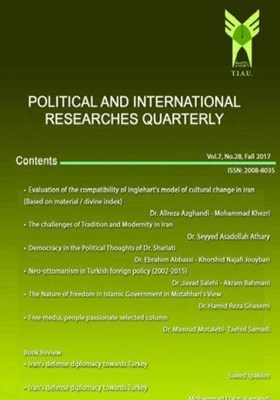Neo-ottomanism in Turkish foreign policy (2002-2015)
Subject Areas : Political and International Researches Quarterly
Keywords: Turkish foreign policy, Neo-Ottomanism, the AKP, constructivist,
Abstract :
A brief look at Turkey's actions in recent years and especially since 2002 (after the rise to power of the Justice and Development Party), clearly shows the changes in Turkish foreign policy. Ankara is on track to achieve improved status in Islam world and international relations and we can see its manifestation in the development of its relations with Islamic countries and the Middle East. This policy is called Neo-Ottomanism. Turkey after decades of one-sided orientation to the West, now adopted a middle ground and more balanced policy toward the Middle East in accordance with its national interests, and expands its relations with the Muslim world and the West. Turkey calls being ranked the world's 10 prime power to 2023 and in recent years the country's efforts to establish balanced relations with world powers, polarization in the Muslim world and settle disputes with its neighbors could be analyzed in this context. This paper attempts to analysis AKP's strategy in foreign policy according to constructivist approach. So, our main question is why was the identity of Neo-Ottomanism the base of Turkish foreign policy? And it is a hypothesis which will follow that Turkey with the aim of restoring its influence in the region and set the political direction and economic development in this area, chose the Neo-Ottomanism identity as its foreign policy
_||_

